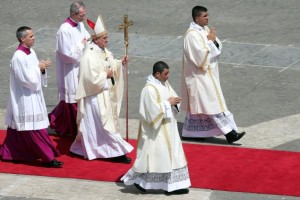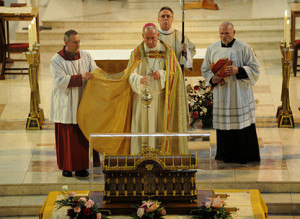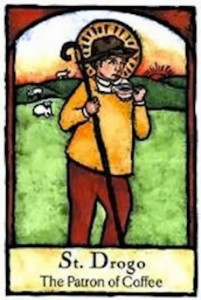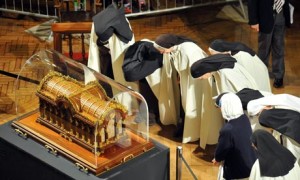Skip to comments.
Rome, Her Saints, & the Gospel
The Cripplegate ^
| May 20, 2015
| Eric Davis
Posted on 05/28/2015 8:12:00 AM PDT by RnMomof7
 This past weekend pope Francis canonized four new saints in a ceremony which received extra attention as two of the four were of Palestinian origin. One of the new Palestinian saints, Sister Mariam Baouardy (1846-1878), was a mystic and stigmatic also known as “Mary Jesus Crucified.” She was a Palestinian and foundress of the Discalced Carmelites of Bethlehem in the late 1800’s. The other new Palestinian saint, Sister Marie Alphonsine Danil Ghattas (1843-1927), was a co-founder of the Congregation of the Rosary Sisters, who spent much of her life in Bethlehem founding schools and orphanages.
This past weekend pope Francis canonized four new saints in a ceremony which received extra attention as two of the four were of Palestinian origin. One of the new Palestinian saints, Sister Mariam Baouardy (1846-1878), was a mystic and stigmatic also known as “Mary Jesus Crucified.” She was a Palestinian and foundress of the Discalced Carmelites of Bethlehem in the late 1800’s. The other new Palestinian saint, Sister Marie Alphonsine Danil Ghattas (1843-1927), was a co-founder of the Congregation of the Rosary Sisters, who spent much of her life in Bethlehem founding schools and orphanages.
Despite the interesting politics of the situation, we will stick to commenting on the theological issues. What is a saint? How does one become a saint? And what is Rome doing when they canonize someone?
First, a brief theology on Roman Catholicism’s view of the saints.
 The term canonization refers to a decree that is binding on the Universal Church issued from the pope which commands the public ecclesiastical veneration of an individual.
The term canonization refers to a decree that is binding on the Universal Church issued from the pope which commands the public ecclesiastical veneration of an individual.
Rome’s criteria for recognizing an individual as a saint involves a few steps. First, the person’s life is evaluated to determine if, according to Rome, they possessed orthodox doctrine and heroic virtue, normally a number of years after death. Upon Rome’s approval, the individual is considered “venerable.” Then, the nominee is typically beatified, on the condition that a miracle occurred after the individual’s death and consequent of petition to that individual. According to Rome, this ensures that the saint-candidate is both in heaven and able to intercede for those who pray to them. At this point, the individual is permitted by Rome to be beatified, though not yet canonized. Finally, the candidate will be declared a saint upon Rome’s determination that they performed a second miracle. It should be noted that typically only the saints are said to be in heaven for certain. “The title of saint tells us that the person lived a holy life, is in heaven, and is to be honored by the universal Church” (http://www.catholic.org/saints/faq.php). Saints are thought to be special friends and servants of God whose holy lives have made them worthy of his special love. Once the pope canonizes the individual, the declaration is infallible and irrevocable.
 Saints are officially venerated throughout the year. “All Saints’ Day” falls on November 1 and, according to Urban IV, was created “to supply any deficiencies in the faithful’s celebration of saints’ feasts during the year.” Many of the saints have specific days set for their veneration. A look at the Roman Catholic saint calendar is simply exhausting due to the sheer quantity of saint holidays. For example, today (May 20th) venerates St. Bernadine of Sienna, the patron saint of gambling, due to his preaching against the practice. June 13th venerates St. Anthony of Padua, the patron saint of lost items, to whom some Catholics are taught to pray, “Dear St. Anthony, come around, something is lost and can’t be found.”
Saints are officially venerated throughout the year. “All Saints’ Day” falls on November 1 and, according to Urban IV, was created “to supply any deficiencies in the faithful’s celebration of saints’ feasts during the year.” Many of the saints have specific days set for their veneration. A look at the Roman Catholic saint calendar is simply exhausting due to the sheer quantity of saint holidays. For example, today (May 20th) venerates St. Bernadine of Sienna, the patron saint of gambling, due to his preaching against the practice. June 13th venerates St. Anthony of Padua, the patron saint of lost items, to whom some Catholics are taught to pray, “Dear St. Anthony, come around, something is lost and can’t be found.”  There are others, for example, St. Genesius (the patron saint of theatrical performers), St. Francis Borgia (the patron saint of earthquakes), St. Teresa of Avila (patron saint of headaches), St. Isidore of Seville (the patron saint of the internet), St. Apollonia (the patron saint of toothaches), St. Fiarce (patron saint of taxi drivers), and, my personal favorite, St. Drogo (the patron saint of unattractive people and coffee). In case one struggles to remember which saint is to be venerated on which day, a “Saint of the Day” smart phone app has been created to assist with that.
There are others, for example, St. Genesius (the patron saint of theatrical performers), St. Francis Borgia (the patron saint of earthquakes), St. Teresa of Avila (patron saint of headaches), St. Isidore of Seville (the patron saint of the internet), St. Apollonia (the patron saint of toothaches), St. Fiarce (patron saint of taxi drivers), and, my personal favorite, St. Drogo (the patron saint of unattractive people and coffee). In case one struggles to remember which saint is to be venerated on which day, a “Saint of the Day” smart phone app has been created to assist with that.
Additionally, prayers are to be offered both by the saints and to the saints. In other words, the saints can pray for you, as well as be prayed to by you.
But, despite the profuse teaching, the Roman Catholic doctrine of the saints violates Scripture on several crucial points. Here are a few of them:
- The headship of the church belongs to Christ alone.
Rome’s practice of canonization is largely an authority issue. In Roman Catholic teaching, the pope is considered head of the church and vicar of Christ, among other things. As such, he is thought to have the final say on matters such as who is and is not a saint. His act of canonization is said to be infallible, irrevocable, and universally binding. These pronouncements are fundamentally rooted in the authority and headship said to rest in the pope.
However, Scripture teaches that Christ is the perpetual head of the church. “And He put all things in subjection under His feet, and gave Him as head over all things to the church, which is His body, the fullness of Him who fills all in all” (Eph. 1:22-23). As such, he alone has the authority to declare who is in heaven, who is not, and who are saints, and who are not.
- Prayer is to be directed towards God alone.
If God’s people were to pray to the saints, certainly Scripture would teach that. But the overwhelming testimony of Scripture teaches that prayer be directed towards God. For example, when Christ taught us how to pray, he instructed us to pray to God: “But when you pray…pray to your Father…” (Matt. 6:6), “Pray, then, in this way: ‘Our Father who is in heaven…’” (Matt. 6:9), and, “…will not God bring about justice for His elect who cry to Him…” (Luke 18:7). In each of these teachings, we are instructed to pray to God.
The Apostle Paul instructed that we pray to God: “Be anxious for nothing, but in everything by prayer and supplication with thanksgiving let your requests be made known to God” (Phil. 4:6).
 The biblical examples of prayer describe prayer being directed towards God alone. Not one prayer in the Psalms is directed towards the dead. Further, both Jesus (e.g. John 11:41, 17:1) and the Apostles prayed only to God (e.g. Acts 1:24, 4:24, 16:25).
The biblical examples of prayer describe prayer being directed towards God alone. Not one prayer in the Psalms is directed towards the dead. Further, both Jesus (e.g. John 11:41, 17:1) and the Apostles prayed only to God (e.g. Acts 1:24, 4:24, 16:25).
Rome argues that God’s people ought to ask the dead saints to pray for them on the grounds that we ask living people to pray for us. But there is a problem with that: we can speak with the living, but we are forbidden to do so with the dead (Deut 18:10-12). “And when they say to you, ‘Inquire of the mediums and the necromancers who chirp and mutter,’ should not a people inquire of their God? Should they inquire of the dead on behalf of the living?” (Isa. 8:19). Prayer is to be directed only to God.
- Veneration is to be directed towards God alone.
 Rome argues that there is nothing wrong with honoring the saints since we honor the living. However, Rome teaches that the saints are to be given more than honor. When a saint is canonized, the church is under mandate, by papal infallibility, to venerate them. Combine that with the act of praying to the saints, and the consequence is idolatry, which Scripture condemns (Exod. 20:4-5, Matt. 4:10). Whether or not Rome explicitly affirms the worship of the saints, the actions are clear enough.
Rome argues that there is nothing wrong with honoring the saints since we honor the living. However, Rome teaches that the saints are to be given more than honor. When a saint is canonized, the church is under mandate, by papal infallibility, to venerate them. Combine that with the act of praying to the saints, and the consequence is idolatry, which Scripture condemns (Exod. 20:4-5, Matt. 4:10). Whether or not Rome explicitly affirms the worship of the saints, the actions are clear enough.
- People are made saints by faith in the Person and work of Christ alone.
The most serious issue with Rome’s teaching on the saints relates to the biblical gospel of Jesus Christ. Rome teaches that saints are really the only individuals who can have the assurance of heaven, and have been granted that status through extraordinary morality and miracles. For that, Rome’s doctrine of the saints commits grievous error.
The title, “saint,” does not refer to an elite Christian, but every Christian. For example, the Apostle Paul referred to everyone in the churches at Rome (Rom. 1:7), Ephesus (Eph. 1:1), and Philippi (both lay people and deacons and elders) as “saints” (Phil. 1:1). And, perhaps outrageously from a human standpoint, the Apostle referred even to the regenerate Corinthians as “saints” (1 Cor. 1:2).
How in the world could sinful and simple, nobodies across the Roman Empire be considered saints?
Contrary to Rome, it is not our works that merit the status of sainthood and entrance into heaven with God. “Saint” is a God-given title to all who have been justified by faith alone in the Person and substitutionary work of Jesus Christ. God placed the full penalty of our sin on the sinless Christ when he died on the cross. Consequently, the most flagrant sinner may be declared a saint and in the right with God by faith alone in Christ alone. We become a saint, not by our valiant display of deeds, but by the vicarious death of Christ. Every ounce of God’s wrath due sinners was turned to Christ such that we can rest in our standing as saints of Christ and the assurance of heaven to come. Sinners become saints, not by heroic works, but humble faith. You do not need extraordinary virtue to secure sainthood with God, but an extraordinary Savior.
“Therefore, since we have been justified by faith, we have peace with God through our Lord Jesus Christ” (Rom. 5:1).
Along with being biblically unsubstantiated, Rome’s teaching on the saints contradicts Scripture on some of the most fundamental doctrines of Christianity. In light of these serious biblical errors, it must be rejected.
TOPICS: Apologetics; Evangelical Christian; Theology; Worship
KEYWORDS: canonization; lies; moacb; prayer; rome; saints; strawman; stupid
Navigation: use the links below to view more comments.
first previous 1-20, 21-40, 41-60, 61-80 ... 161-178 next last
To: MHGinTN
Stupid “apologetics” from the Proddie camp deserves the contempt it gets.
21
posted on
05/28/2015 10:22:04 AM PDT
by
Campion
To: CynicalBear
That's the way it worked! The pagans had gods for this and gods for that and with Catholics it's saints for this and saints for that. A god over a city became a saint over a city. And when you ask for some kind of scriptural support for such beliefs you get...
22
posted on
05/28/2015 10:29:10 AM PDT
by
DungeonMaster
(Of those born of women there is not risen one greater than John The Baptist.)
To: safeasthebanks
And there’s not a person on earth excepting Jesus, who ever did that or is capable of doing that.
23
posted on
05/28/2015 10:46:47 AM PDT
by
metmom
(...fixing our eyes on Jesus, the Author and Perfecter of our faith...)
To: metmom
No idea what your point is.....
24
posted on
05/28/2015 10:48:35 AM PDT
by
safeasthebanks
("The most rewarding part, was when he gave me my money!" - Dr. Nick)
To: MHGinTN
Some are really good at that. They deny emptied praying to Mary when there are sites with nothing but prayers to her. There are pictures of people bowing to dead people, bones, body parts, etc. There is even a picture of the pope kissing the Quran. I just do not understand why they keep defending them. Many do not seem to know what the Bible says and what is worse, they do not care. As long as the pope says something, it has to be right. How can anyone put that trust in one man? Then they bring up a few Protestants for wrong doing when it is obvious they never accepted Christ in the first place. I avoid people like that. It is a great thing that Luther did what he did. He saw something was wrong and tried to correct it. More people should have that much courage.
25
posted on
05/28/2015 10:51:36 AM PDT
by
MamaB
To: Mark17
26
posted on
05/28/2015 10:52:18 AM PDT
by
MamaB
To: safeasthebanks
Nobody really can qualify being a saint based on personal holiness of life even though it may appear so from outward appearances.
Nobody knows the heart and the thoughts in a person’s heart and mind.
Canonization is only based on outward appearances.
27
posted on
05/28/2015 10:53:45 AM PDT
by
metmom
(...fixing our eyes on Jesus, the Author and Perfecter of our faith...)
To: Campion
If it’s so stupid, you should have no trouble refuting it point by point.
Go ahead.
Show us Scriptural justification for the whole practice.
28
posted on
05/28/2015 10:56:12 AM PDT
by
metmom
(...fixing our eyes on Jesus, the Author and Perfecter of our faith...)
To: metmom
A: Your point (if I even understand it) has nothing to do with why I posted what I did.
B: People are considered "good" or "bad" (not even getting into the whole canonization thing) based on their words and deeds, not "appearances". This is the only possible way we, as humans, can and should judge "good" from "bad". Actions speak louder than words, as they say. Are you saying that there is no one, living or dead, that you believe to be a good person, because you can't read their thoughts??!?!? Ridiculous.
29
posted on
05/28/2015 11:01:50 AM PDT
by
safeasthebanks
("The most rewarding part, was when he gave me my money!" - Dr. Nick)
To: MamaB
She does a great job. It's a dirty job, but somebody's gotta do it. Heaven or Hell, however. Why would anyone take an awful, terrifying, horrible chance, by struggling their entire life, never knowing if they have done enough to earn Heaven, and sink into the tomb without one ray of hope of ever making it? If they don't make it, they are eternally up a creek. Why would anyone do that? Oh well, I simply refuse to wait till I kick the bucket to know for sure.
30
posted on
05/28/2015 11:06:52 AM PDT
by
Mark17
(Through all my days, and then in Heaven above, my song will silence never, I'll worship Him forever)
To: DungeonMaster
>>And when you ask for some kind of scriptural support for such beliefs you get...<<
The sounds of silence.
31
posted on
05/28/2015 11:28:43 AM PDT
by
CynicalBear
(For I decided to know nothing among you except Jesus)
To: CynicalBear
32
posted on
05/28/2015 11:32:05 AM PDT
by
ealgeone
To: ealgeone
LOL! I knew that’s what would come to mind.
33
posted on
05/28/2015 11:34:16 AM PDT
by
CynicalBear
(For I decided to know nothing among you except Jesus)
To: Campion; RnMomof7
Stupid “apologetics” from the Proddie camp deserves the contempt it gets. Must have hit home when the name calling shows up!
Would love for the catholic to show us where this is squared away with the Word.
I'll start painting my house while we wait.
34
posted on
05/28/2015 11:36:33 AM PDT
by
ealgeone
To: CynicalBear
The sounds of silence. Or things like: Heb 12:1 Therefore we also, since we are surrounded by so great a cloud of witnesses,
Oh yes so the "great cloud of witnesses" is this giant universe of "saints" who are witnessing our lives and prayers and taking them to the bigger God using their special saintly influence to get-er-done when our pathetic prayer directly to the Father yields unsatisfactory results.
So there is dissatisfaction with the simplicity of the practice of Christianity per the bible. Dissatisfaction with the work of the Cross and dissatisfaction with the effectiveness of prayers to the Father. So when Christianity doesn't satisfy, add more stuff.
35
posted on
05/28/2015 11:39:57 AM PDT
by
DungeonMaster
(Of those born of women there is not risen one greater than John The Baptist.)
To: RnMomof7
Good grief, I actually thought Catholics were smarter than this. The depth of their pagan idolatry is incredible. Very little, if any, difference between these patron “saints” they conjure up, and the gods of the pagans.
Thank God for the reformers who went against these abominations, and at the risk of their lives to do so.
And thanks to you for posting this. I learn a lot on FR.
To: ealgeone
This may be a little off track for the thread... but it's happened before, right?
Simon and Garfunkel
I was in Jr High catechism class. A "brother" (but he was white) was "teaching" the class.
I'm guessing that he was going through some "troubled water" at the time. He was young - probably in his 20s.
He was taken with Simon and Garfunkel, and the album "The Graduate." I think the head of his order at his monastery wouldn't let the brothers have albums, or unapproved music, or something. Anyway, he couldn't get his hands on any of the songs.
I volunteered to bring in the songs (recorded on my 5-inch Tandy RS reel-to-reel) recorder at the next class.
He especially wanted "Sounds of Silence" - I think he was depressed. Who wouldn't be - given his circumstances?
He was pretty upset at the next class because I brought in the movie sound track version and it wasn't complete. He needed all the words in order to soothe his mood.
He didn't like me anymore after I let him down.
I wonder what ever happened to him...
These were the days when the RCC was looking at acoustic guitars as edgy and somewhat radical -- especially when played in the Mass.
...when we couldn't eat meat on Friday. Even the public schools served fish on Friday.
Wow.
How times and traditions change.
37
posted on
05/28/2015 12:42:34 PM PDT
by
kinsman redeemer
(The real enemy seeks to devour what is good.)
To: Campion
Stupid< apologetics from any camp is amusing ... until it is able to lead people astray. Don't you know that You are the temple of God if so be that God dwells in you? 'For it is God Who is in you, to will and do of His good pleasure.' 'Be ye therefore transformed by the renewing of your mind.' 'Let this mind be in you which was also in Christ Jesus.' "And be not conformed to this world: but be ye transformed by the renewing of your mind, that ye may prove what is that good, and acceptable, and perfect, will of God." Rom 12:2
The above are the work of the Holy Spirit of God, not the Vatican.
38
posted on
05/28/2015 12:47:17 PM PDT
by
MHGinTN
(Is it really all relative, Mister Einstein?)
To: kinsman redeemer
My small school served fish on Fridays for the 3 families who were Catholics. The rest of us did not think anything about it since we loved fish any day of the week. Then they changed.
39
posted on
05/28/2015 2:52:07 PM PDT
by
MamaB
To: RnMomof7
The headship of the church belongs to Christ alone. Yes, and he is free to operate that headship through any agents he choses.
Jesus said to him in reply, “Blessed are you, Simon son of Jonah. For flesh and blood has not revealed this to you, but my heavenly Father. And so I say to you, you are Peter, and upon this rock I will build my church, and the gates of the netherworld shall not prevail against it. I will give you the keys to the kingdom of heaven. Whatever you bind on earth shall be bound in heaven; and whatever you loose on earth shall be loosed in heaven.” (Matthew 16:17-19) When they had finished breakfast, Jesus said to Simon Peter, “Simon, son of John, do you love me more than these?”* He said to him, “Yes, Lord, you know that I love you.” He said to him, “Feed my lambs.” He then said to him a second time, “Simon, son of John, do you love me?” He said to him, “Yes, Lord, you know that I love you.” He said to him, “Tend my sheep.” He said to him the third time, “Simon, son of John, do you love me?” Peter was distressed that he had said to him a third time, “Do you love me?” and he said to him, “Lord, you know everything; you know that I love you.” [Jesus] said to him, “Feed my sheep." (John 21:15-17)
The "keys to the kingdom" are a specific reference to the office of the Master of the Palace, i.e. vicar, in Isaiah 22:15-25. To reject the authority given to Peter and his successors by Jesus Christ is to reject Jesus Christ himself.
Prayer is to be directed towards God alone.
Worship yes, prayer no. Nowhere in the Bible does it forbid asking those in Heaven to pray for us. Paul asks others to pray for him: "at the same time, pray for us, too, that God may open a door to us for the word, to speak of the mystery of Christ, for which I am in prison, that I may make it clear, as I must speak."(Colossians 4:3-4). Asking prayers of others does not offend God. Nor is there any injunction against asking for the prayers of those in Heaven. To say otherwise is just an attempt to impose Protestant opinion.
Veneration is to be directed towards God alone.
Again, worship yes, veneration no. Even God commands us to honor our parents. It is an act of calumny (and thus the sin of bearing false witness) to confuse worship and veneration.
People are made saints by faith in the Person and work of Christ alone.
This goes to the error of sola fide, which is nowhere to be found in the Bible. The arguments against it well known so there is no need to repeat them here.
In the end, what appears at first sight to be Biblical attacks against the Catholic understanding of the saints is nothing more than non-Biblical Protestant opinion.
Navigation: use the links below to view more comments.
first previous 1-20, 21-40, 41-60, 61-80 ... 161-178 next last
Disclaimer:
Opinions posted on Free Republic are those of the individual
posters and do not necessarily represent the opinion of Free Republic or its
management. All materials posted herein are protected by copyright law and the
exemption for fair use of copyrighted works.
FreeRepublic.com is powered by software copyright 2000-2008 John Robinson
 This past weekend pope Francis canonized four new saints in a ceremony which received extra attention as two of the four were of Palestinian origin. One of the new Palestinian saints, Sister Mariam Baouardy (1846-1878), was a mystic and stigmatic also known as “Mary Jesus Crucified.” She was a Palestinian and foundress of the Discalced Carmelites of Bethlehem in the late 1800’s. The other new Palestinian saint, Sister Marie Alphonsine Danil Ghattas (1843-1927), was a co-founder of the Congregation of the Rosary Sisters, who spent much of her life in Bethlehem founding schools and orphanages.
This past weekend pope Francis canonized four new saints in a ceremony which received extra attention as two of the four were of Palestinian origin. One of the new Palestinian saints, Sister Mariam Baouardy (1846-1878), was a mystic and stigmatic also known as “Mary Jesus Crucified.” She was a Palestinian and foundress of the Discalced Carmelites of Bethlehem in the late 1800’s. The other new Palestinian saint, Sister Marie Alphonsine Danil Ghattas (1843-1927), was a co-founder of the Congregation of the Rosary Sisters, who spent much of her life in Bethlehem founding schools and orphanages.


 The biblical examples of prayer describe prayer being directed towards God alone. Not one prayer in the Psalms is directed towards the dead. Further, both Jesus (e.g.
The biblical examples of prayer describe prayer being directed towards God alone. Not one prayer in the Psalms is directed towards the dead. Further, both Jesus (e.g. 